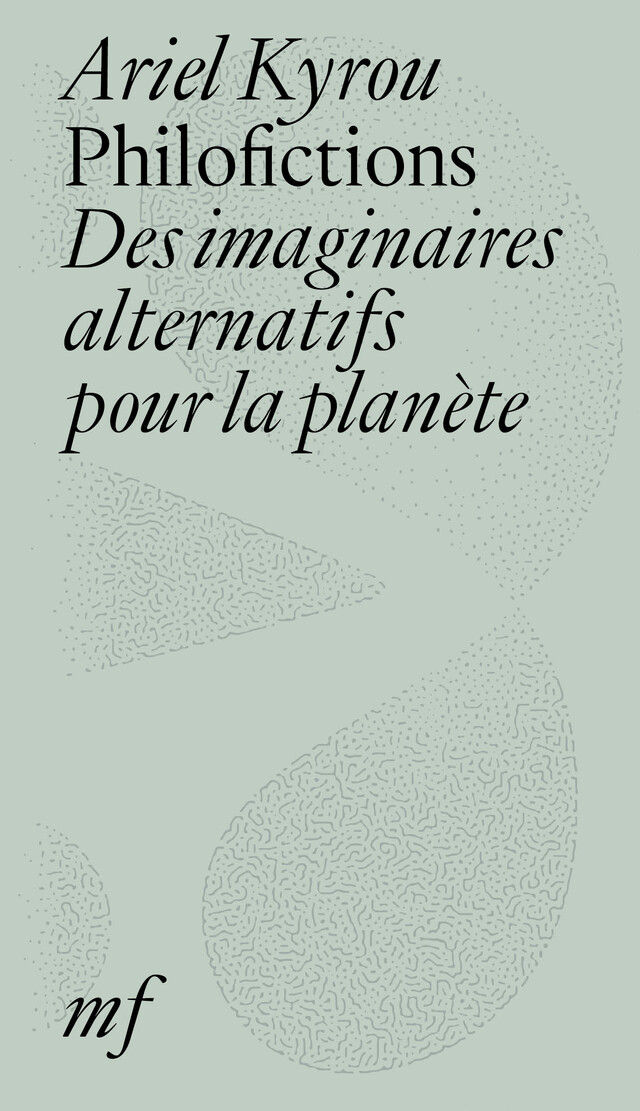
Ariel Kyrou
Philofictions. Des imaginaires alternatifs pour la planètePhilofictions. Alternative Imaginaries for the Planet260 pages. September 2024. World rights available
Inventions (MF)
NON-FICTION
NATURE - ECOLOGY - ENVIRONMENTAL STUDIES
ESSAY
DIGITAL TECHNOLOGIES
Et si les œuvres de fiction étaient l’une des réponses au sentiment de blocage face aux enjeux du réchauffement climatique ou aux leurres des régressions identitaires ? Une philofiction n’est pas une fuite hors du réel. Elle interroge tout au contraire le caractère inéluctable des futurs qui nous semblent promis. Elle nous redonne le goût du possible. À travers l’analyse des œuvres de Becky Chambers, Octavia E. Butler, Philip K. Dick, Li-Cam ou Kim Stanley Robinson, Ariel Kyrou montre comment la fiction, en dessinant des imaginaires alternatifs, transforme notre être-au-monde et notre relation aux altérités humaines et non-humaines. La philofiction est plus qu’un récit, elle est une action qui nous enjoint à vivre et à penser autrement.
La fiction a des pouvoirs mais ils sont d’une nature singulière. Afin de les penser, Ariel Kyrou croise et reformule des concepts qu’il emprunte autant à la philosophie qu’à la théorie des arts : effiction, feintise, devenir, transdescendance, inséparation, etc. Dans un monde où les fictions abondent et où certaines entendent se substituer aux faits, il est essentiel d’apprendre à distinguer les bonnes des mauvaises : les philofictions émancipatrices des schizofictions mortifères. Une des grandes vertus de ce livre est de nous en donner les moyens.
Ariel Kyrou, né en 1962, est un journaliste, écrivain, essayiste et chroniqueur de radio français, spécialisé dans les nouvelles technologies, les musiques électroniques, la science-fiction et les grandes avant-gardes artistiques du siècle dernier.
Il enseigne les pratiques culturelles de l’âge numérique et les imaginaires du futur en première année de Master de médiation culturelle et scientifique à l’Université de Versailles/Saint-Quentin en Yvelines.
What if works of fiction were one of the answers to the feeling of being blocked by the challenges of global warming or the lures of identity regression? Philofiction is not an escape from reality. On the contrary, it questions the inevitability of the futures that seem promised to us. It gives us back a taste for the possible. Through an analysis of the works of Becky Chambers, Octavia E. Butler, Philip K. Dick, Li-Cam and Kim Stanley Robinson, Ariel Kyrou shows how fiction, by creating alternative imaginaries, transforms our being-in-the-world and our relationship with human and non-human otherness. Philofiction is more than a story, it is an action that urges us to live and think differently.
Fiction has powers, but they are of a singular nature. To think about them, Ariel Kyrou crosses and reformulates concepts that he borrows from both philosophy and art theory: effiction, feintise, becoming, transdescendence, inseparation, and so on. In a world where fictions abound, and where some of them seek to replace facts, it is essential to learn to distinguish the good from the bad: emancipatory philofictions from mortifying schizofictions. One of the great virtues of this book is that it gives us the means to do just that.
Translated with DeepL.com (free version)
Ariel Kyrou, born in 1962, is a French journalist, writer, essayist and radio columnist, specializing in new technologies, electronic music, science fiction and the great artistic avant-garde of the last century.
He teaches the cultural practices of the digital age and the imaginaries of the future in the first year of Master of cultural and scientific mediation at the University of Versailles/ Saint-Quentin en Yvelines.